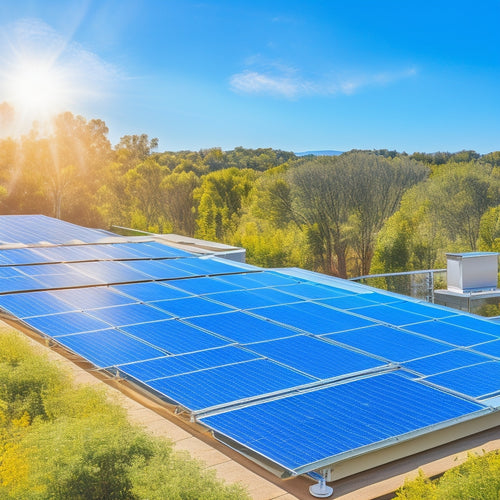
How Small Businesses Can Reduce Energy Costs With These 5 Strategies
Share
To reduce energy costs, start by upgrading to energy-efficient equipment, which lowers operational expenses and increases profitability. Implement regular maintenance to extend equipment lifespan and catch issues early. Investigate renewable energy options like solar panels to enhance your sustainability profile while decreasing costs. Adopt eco-friendly practices, such as purchasing from local suppliers, to minimize waste and lower energy consumption. Finally, conduct energy audits to identify inefficiencies, allowing you to optimize your energy use further. By following these strategies, you can enhance operational efficiency and greatly cut expenses; there's more to examine on maximizing savings and sustainability.
At a Glance
- Upgrade to energy-efficient equipment to lower operational expenses and improve profitability over time.
- Implement regular maintenance to extend equipment lifespan and prevent costly repairs.
- Utilize renewable energy options, such as solar panels, to reduce energy costs and enhance sustainability.
- Conduct energy audits to identify inefficiencies and target areas for improvement in consumption.
- Adopt eco-friendly practices, like sourcing locally, to minimize waste and reduce overall energy usage.
Lower Long-Term Operational Expenses
Upgrading to energy-efficient equipment can greatly cut your long-term operational expenses.
By utilizing renewable energy solutions, businesses can further reduce their energy costs and stabilize expenses against price hikes.
Regular maintenance practices not only extend the life of your equipment but also guarantee it runs at peak efficiency, reducing energy waste.
Energy-efficient Equipment Upgrades
Investing in energy-efficient equipment can greatly reduce long-term operational expenses for small businesses. By integrating smart technology, you can monitor usage and optimize power management. Conducting energy audits helps identify areas for improvement, allowing you to take advantage of efficiency incentives and rebate programs. As you upgrade your equipment, consider options that support system integration to enhance overall performance.
Here's a quick comparison of energy-efficient equipment benefits:
| Equipment Type | Benefits | Incentives Available |
|---|---|---|
| LED Lighting | Lower energy consumption | Rebates for installation |
| Smart Thermostats | Improved climate control | Efficiency incentives |
| Energy Star Appliances | Reduced consumption analysis | Green certifications available |
| Variable Frequency Drives | Enhanced demand response | Utility company programs |
Regular Maintenance Practices
Regular maintenance practices are vital for small businesses looking to lower long-term operational expenses. By implementing preventive maintenance, you can proactively address issues before they escalate, saving on costly repairs.
Start with energy audits to identify inefficiencies within your systems. Regularly optimizing your HVAC efficiency guarantees that your heating and cooling systems run effectively, reducing energy waste.
Consider lighting upgrades and insulation improvements as part of your routine checks. Upgrading to energy-efficient lighting can dramatically cut electricity costs, while better insulation helps maintain temperature, thereby reducing HVAC strain.
Equipment calibration is another significant aspect; it guarantees that machinery operates at peak efficiency, minimizing energy consumption.
Don't underestimate the significance of routine inspections. Regularly examining your equipment and systems allows you to catch minor problems before they become major expenses.
This attention to detail not only extends the lifespan of your equipment but also enhances overall performance. By committing to these regular maintenance practices, you enable your business to operate more sustainably while enjoying the freedom that comes with reduced operational costs.
Cost Savings Over Time
When you invest in energy efficiency upgrades, you're not just cutting costs in the short term; you're positioning your business for sustained savings over time.
Implementing solutions like effective energy management can greatly enhance your operational efficiency, reducing energy waste and costs.
These upgrades often lead to reduced operational expenses and can enhance your overall profitability.
Long-Term Investment Benefits
Making smart energy choices can lead to considerable cost savings for small businesses over time. By investing in energy efficiency now, you can reap the benefits in the long run. Start with energy audits to identify inefficiencies and potential upgrades. Employ financial incentives like utility rebates and project financing to ease upfront costs.
Here's a breakdown of potential savings based on different strategies:
| Strategy | Initial Investment | Annual Savings |
|---|---|---|
| Energy Audits | $500 | $1,200 |
| Employee Training | $1,000 | $1,500 |
| Technology Integration | $3,000 | $4,000 |
| Energy Monitoring | $800 | $1,000 |
| Budget Planning | $200 | $400 |
Implementing these strategies not only helps in budget planning but also encourages sustainability reporting. With proper energy monitoring, you can perform a cost analysis to measure your savings. By prioritizing employee training, you'll cultivate a culture of energy awareness. Over time, these investments can considerably impact your bottom line, granting you greater freedom to focus on growth.
Energy Efficiency Upgrades
Upgrading to energy-efficient systems can markedly impact your operational costs and overall sustainability. By investing in modern technologies, like LED lighting and high-efficiency HVAC units, you're not just cutting costs today, but you're also setting yourself up for significant savings in the long run.
Energy audits can help identify the areas where you can make the most impactful changes.
Additionally, consider implementing behavioral changes within your team. Simple actions, such as turning off lights when leaving a room or adjusting thermostats, can lead to substantial savings.
It's crucial to cultivate a culture of energy awareness among employees, as small shifts in daily habits can accumulate over time.
While the initial investment in energy-efficient upgrades might seem intimidating, the long-term savings on utility bills, coupled with potential tax incentives, can make these upgrades financially savvy.
You'll also enhance your brand's reputation by demonstrating a commitment to sustainability, appealing to eco-conscious customers.
Ultimately, by prioritizing energy efficiency, you're not just improving your bottom line—you're also contributing to a healthier planet. Welcome these upgrades, and watch your savings grow.
Key Benefits of Implementation
Implementing energy cost strategies can markedly lower your operating expenses, freeing up resources for other essential areas of your business.
Additionally, you'll enhance your sustainability practices, which not only elevates your brand image but also meets the growing consumer demand for environmentally responsible companies.
For instance, energy assessments can help identify inefficiencies, leading to further savings.
These benefits create a strong case for prioritizing energy efficiency in your operations.
Lower Operating Expenses
Lowering operating expenses is essential for small businesses looking to enhance their financial stability and competitiveness. By focusing on cost reduction strategies, you can elevate operational efficiency and create a more resilient business model. Implementing energy-efficient practices leads to immediate savings and long-term benefits, allowing you to allocate resources to growth and innovation.
Here's a quick overview of how you can achieve lower operating expenses:
| Strategy | Benefit |
|---|---|
| Energy-efficient equipment | Reduces energy bills |
| Smart energy management | Optimizes usage |
| Regular maintenance | Prevents costly repairs |
By investing in these strategies, you're not only cutting costs, but also improving your overall operational efficiency. This means fewer resources wasted and more funds available for other pressing needs, ultimately enhancing your business's agility.
In the ever-competitive environment, every dollar saved counts. Embracing these energy cost reduction techniques helps you create a sustainable financial atmosphere, opening doors for future opportunities and freeing you from the constraints of high operational expenses. You'll be able to focus on what truly matters—growing your business and achieving your vision.
Enhanced Sustainability Practices
Adopting enhanced sustainability practices can convert your small business in multiple ways.
First, by implementing sustainable sourcing, you not only support eco-friendly suppliers but also often reduce costs. These suppliers typically offer better long-term pricing structures and can enhance your brand's reputation. Customers are increasingly drawn to businesses that prioritize sustainability, which can lead to increased sales and loyalty.
Next, focusing on waste reduction can dramatically lower your operating expenses. By analyzing your operations, you can identify areas where waste occurs, whether it's excess packaging or energy inefficiencies. Streamlining these processes not only saves money but also minimizes your environmental footprint.
Moreover, these practices can improve employee morale. When your team sees the company committing to sustainability, they're likely to feel more passionate about their work. This can lead to increased productivity and lower turnover rates, which are essential for small businesses looking to maintain a competitive edge.
Selecting Suitable Energy Solutions
When selecting suitable energy solutions, you need to appraise energy providers based on their reliability, pricing, and service alternatives.
Consider utilizing renewable options, as they can't only reduce costs but also enhance your business's sustainability profile.
Solar power systems, for instance, promote energy independence and resilience while generating clean energy.
Evaluating Energy Providers
Finding the right energy provider is essential for small businesses looking to optimize their energy costs. Start by conducting energy audits to understand your current consumption and identify areas for improvement. This will give you a baseline to evaluate potential providers effectively.
Next, perform a competitive analysis of various energy providers in your area. Look for companies that offer flexible pricing plans, as this can greatly impact your monthly expenses. Don't settle for the first option you find; compare rates, contract terms, and any hidden fees.
Consider the provider's reputation and reliability. Check online reviews and ask fellow business owners for recommendations. A provider with excellent customer service can make a huge difference when issues arise.
Additionally, inquire about any energy efficiency programs they offer. Providers that support energy-saving initiatives can help you further reduce costs, making them a more attractive option.
Ultimately, the goal is to choose a provider that aligns with your business needs, offers competitive rates, and supports your long-term energy strategy. Doing your homework now can lead to considerable savings and freedom in managing your energy expenses.
Utilizing Renewable Options
After you've selected a suitable energy provider, exploring renewable options can greatly improve your energy strategy.
Consider solar panel installation for your business. This not only cuts costs but also positions you as a leader in sustainability. Wind energy systems can also provide a reliable source of power, especially in areas with consistent winds.
Energy storage solutions, like batteries, can guarantee you make the most of your renewable energy generation, storing excess power for later use. Additionally, participating in green certification programs can enhance your brand's reputation, attracting eco-conscious customers.
Look into biomass energy options, which can employ waste materials to generate power efficiently. Community solar projects allow you to invest in shared solar resources, making renewable energy more accessible without the upfront costs of installation.
Explore renewable energy incentives offered by local governments, which can help offset initial costs. Carbon offset programs can further improve your sustainability efforts, allowing you to compensate for emissions.
Enhanced Sustainability Impact
Adopting eco-friendly practices isn't just good for the planet; it can also greatly reduce your energy costs.
By implementing strategies like energy-efficient lighting and sustainable sourcing, you can enhance your business's sustainability impact while attracting environmentally conscious customers.
You'll find that these changes not only improve your bottom line but also position your brand as a leader in responsible business practices.
Eco-friendly Practices Adoption
Sustainability drives small businesses to adopt eco-friendly practices that not only reduce energy costs but also enhance their overall impact on the environment. By integrating sustainable sourcing into your operations, you can minimize waste and lower energy consumption. This not only helps the planet but also elevates your bottom line.
For instance, consider purchasing materials from local suppliers who practice sustainable methods. This reduces transportation costs and carbon emissions.
Moreover, obtaining green certifications can greatly improve your business's credibility. Customers increasingly prefer brands that demonstrate environmental responsibility. By showcasing your commitment to eco-friendly practices, you attract a loyal customer base while differentiating yourself from competitors.
Additionally, consider implementing energy-efficient technologies, such as LED lighting and smart thermostats. These investments might require upfront costs, but they pay off in energy savings over time.
Regular audits of your energy consumption can also pinpoint areas for improvement, ensuring you're always optimizing your practices.
In adopting these eco-friendly practices, you not only contribute positively to the environment but also enable your business to thrive in a market that values sustainability. Adopt these strategies, and you'll see both financial and ethical benefits.
Frequently Asked Questions
What Are the Initial Costs of Implementing These Energy Strategies?
When considering initial costs, you'll find energy strategies often require an upfront investment. However, don't overlook the long-term savings they can generate, ultimately enhancing your business's financial freedom and sustainability over time.
How Can Employees Contribute to Energy Savings?
Imagine a garden where every employee's effort nourishes the roots of energy savings. By nurturing employee engagement and energy awareness, you'll cultivate a team that actively seeks ways to reduce consumption and enhance efficiency.
Are There Any Government Incentives for Energy Efficiency Upgrades?
Yes, there're government incentives for energy efficiency upgrades. You can benefit from federal rebates and tax credits that help offset costs, making your upgrades more affordable and freeing up resources for other essential business needs.
What Common Mistakes Should Businesses Avoid When Reducing Energy Costs?
Reducing energy costs is like steering through a maze; avoid common mistakes. Don't skip energy audits or underestimate behavioral changes. Ignoring these can lead to wasted resources, limiting your freedom to grow and innovate.
How Can I Measure the Effectiveness of My Energy-Saving Strategies?
To measure your energy-saving strategies' effectiveness, conduct regular energy audits and track performance metrics. This helps you identify improvements, assess savings, and guarantee your efforts lead to maximum energy efficiency and financial freedom for your business.
Explore More
By implementing these five strategies, you can convert your small business into an energy-efficient powerhouse. Think of it as tuning up a vintage engine—each adjustment leads to smoother operation and lower costs. As you choose the right energy solutions, you'll not only save money but also contribute to a more sustainable future. So, take the leap, adopt these practical steps, and watch your operational expenses shrink like a balloon losing air, revealing a healthier bottom line.
Related Posts
-

Net Metering in Renewable Energy's Future
Net metering's future is vital for driving renewable energy growth and financial savings. You can reduce your electri...
-

What Types of Solar Energy Devices Are Available
You'll find several types of solar energy devices available today, each customized to different energy needs. Photovo...
-

Smart Grid Technology Implementation Challenges
You'll encounter several challenges when implementing smart grid technology, particularly in cost management, scalabi...


